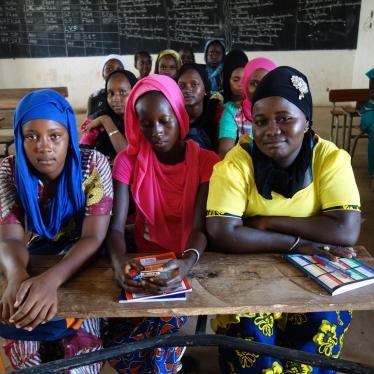(New York) – The awarding of the 2014 Nobel Peace Prize to Indian child rights activist Kailash Satyarthi recognizes the hard fight against child labor and should serve as a call to address this challenge around the globe, Human Rights Watch said today. Satyarthi, 60, launched a campaign against employing children in the worst forms of labor both in India and elsewhere, and has built a movement to encourage businesses to employ ethical practices without child labor.
Satyarthi won the prize jointly with 17-year-old Pakistani activist Malala Yousafzai, a tenacious advocate for the rights of all children, and girls in particular, to attend school and receive a quality education, free from discrimination, violence, and fear.
Satyarthi founded the grassroots organization Bachpan Bachao Andolan (Save the Childhood Movement) in 1983 to help free children from forced labor. In India, economic pressures force poor and marginalized families to hand over their children as bonded laborers for petty loans, or children end up working alongside their families in bondage. These children are often employed in the worst forms of labor, working long hours for very low pay, and vulnerable to verbal, physical, and even sexual abuse. Satyarthi’s work has focused on identifying and rescuing such bonded child workers with the help of other nongovernmental organizations and helping to rehabilitate them.
“Kailash Satyarthi has campaigned tirelessly against the worst forms of child labor and slavery and has given many children a chance at a better life,” said Zama Coursen-Neff, children’s rights director. “The Nobel Committee’s recognition of Malala Yousafzai and Kailash Satyarthi spotlights the importance of protecting children – whether in or out of school.”
The number of child workers worldwide has declined by one-third since 2000, but still remains as high as 168 million children, according to the International Labour Organization. More than half, 85 million, are in hazardous work. Millions of children in India are still engaged in child labor, including in hazardous work. Children are largely employed on farms, in brick kilns, in the silk weaving industry, making fireworks, and also as domestic workers. In October 2013, speaking at the ILO global conference on child labor in Brazil, Satyarthi said, “It’s not just numbers. Every number has a face, and a name, and every child matters.”
Under international law, child labor is prohibited for anyone under 15, or under 14 in some circumstances in developing countries. Hazardous and other worst forms of child labor are prohibited for anyone under 18. Indian law prohibits the employment of children in hazardous work including domestic labor. A law to ban all work by children under 14 and hazardous work for children under 18 was introduced in the Indian parliament in 2012 but has yet to be passed.
In awarding the Peace Prize to Satyarthi, the Nobel Committee acknowledged his contribution to the development of international conventions on children’s rights: “Showing great personal courage, Kailash Satyarthi, maintaining Gandhi’s tradition, has headed various forms of protests and demonstrations, all peaceful, focusing on the grave exploitation of children for financial gain.”
Through his organization, the South Asian Coalition Against Child Servitude, Satyarthi has worked on building consumer resistance and has lobbied effectively for boycotting products by manufacturers who employ child labor. One of his key initiatives has been his work to transform villages into child-friendly spaces where children have greater access to education, organize themselves into child governance bodies, and work with village officials on issues related to children.
The recognition of Satyarthi will draw attention to gaps in enforcing India’s ambitious Right to Education law, which provides free and compulsory education to all children up to age 14. While enrollment has spiked since this law was enacted in 2009, retention remains a serious challenge, with many children from oppressed castes and minority groups dropping out and joining the work force, partly because of the discrimination they face in the classroom.
Human Rights Watch investigations from around the world show that child labor harms children’s health, impedes education, and perpetuates poverty. For instance, child tobacco workers in the US are exposed to nicotine and toxic pesticides, and child miners in Mali and Tanzania use mercury to extract gold from ore, which can cause deadly harm. There are an estimated 15 million child domestic workers worldwide who often work long hours for little pay, and are particularly vulnerable to trafficking, forced labor, and physical and sexual abuse.
“Global action on child labor has been slow and efforts to end the worst forms of child labor are lagging behind,” Coursen-Neff said. “The prize for these two activists should be backed by global action against child labor that includes making primary education truly cost-free, adopting social protections that would improve school attendance for the poorest, and aggressively enforcing child labor laws.”





